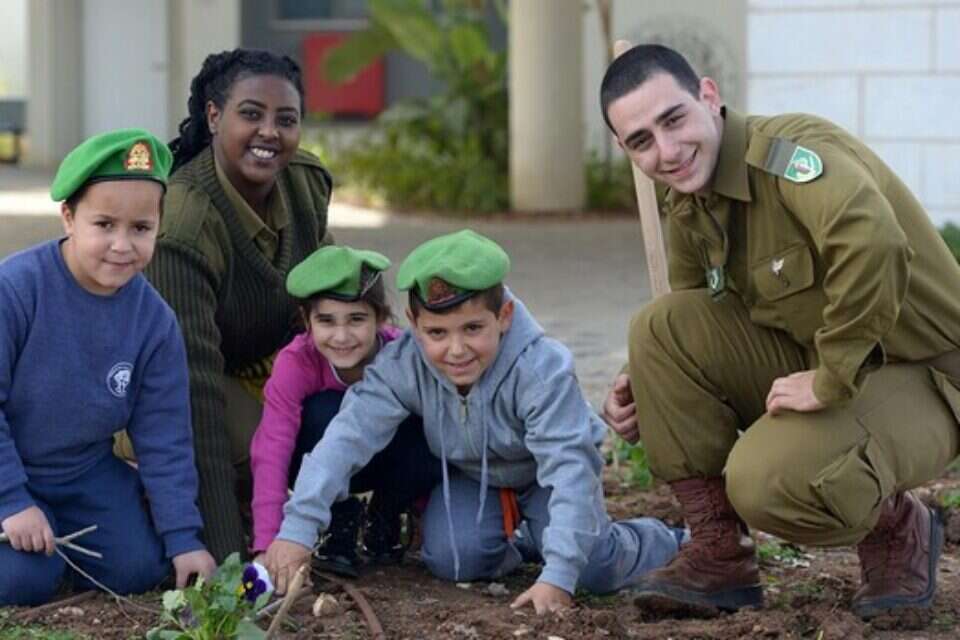This year we celebrate Tu Bashvat in the midst of war, when many of us mourn our loved ones, worry about the safety of our loved ones and pray for the return of the kidnapped. How do you celebrate a happy holiday, full of wine and poetry in such a situation?
A look at the miraculous process of the incarnation of Tu Beshavat invites us to look at the trajectory of our lives as individuals and as a nation in the same way. As the holiday unfolded, we also develop and change.
But it is not a change that cancels everyone we were before, but a change that has growth, a change that knows how to look at who we were - at our values and our traditions, thus creating a stability for us that no external enemy can undermine.
Planting in Biriya (archive), photo: Gini
The Hebrew calendar offers a unique structure: the holidays of Israel derive from an ancient tradition related to the changes in nature and the movements of the earth and the celestial bodies - thus Hanukkah began on the solstice (when the days stop getting shorter and begin to get longer) celebrates the victory of light over darkness, thus Pesach is the spring festival that celebrates the harvest and Sukkot Celebrating the end of autumn and the gathering of grain before the rains.
On each of these cosmic layers, Jewish culture adds a historical layer related to the unique story of the Jewish people - thus Pesach and Sukkot deal with the exodus from Egypt and Hanukkah with the victory of the Maccabees.
But it is not enough to have a holiday to circle the past - the holiday is also a time - a space for committees - a space where we gather together as a community and family, look at our past, discuss the present and dream together about our common future here.
Seder Tu Bashvet is an excellent opportunity to do this precisely in such difficult and complex times as we are experiencing now.
Planting between the springs, photo: Ashhar Betzer
The 15th of Shebat is also based on an ancient cosmic source related to the seasons of the year, which is why it is mentioned in the Mishnah as Rosh Hashanah for Ilanot. In what sense? In the sense of the tax year. This is the point in the year when the allocation of the tithes and contributions to be taken from each tree is decided. Just like the 1.1 nowadays - What is before the 10th in the tribe, will be counted in this tax year and what is after it will be counted already in the next year.
Beyond that, we do not find in our ancient sources a special note for this holiday or a mention of the customs we know today.
Later, the students of the Ari in Safed in the 16th century create the order of 10 in the Kabbalistic tribe and create a correction based on the symbols of the fruits of the land.
Also, the tradition of dried fruits sent from Eretz Yisrael joins the various postcards in which are folded all the longings for the Land.
Planting in the Lavia forest, photo: Ancho Josh \ Gini
With the flourishing of Zionism and the return to Israel, the holiday takes on an additional layer when the Teachers' Union proposes to turn the holiday into a planting holiday in which the students of Israel will plant Hebrew trees in the renewed homeland.
Even today, the holiday is undergoing a process of change when the emphasis shifts to the values of environmental quality and nature conservation that are more suitable for the modern, busy and crowded society that characterizes today's Israel.
The development of the holiday teaches us that we have flexibility in us that allows us to build and understand from the traditions of the past and change them a little so that they fit who we are today and help us get closer to who we want to be in the future.
Like the tree that emerges from the ground in pain, but due to its deep roots it grows, grows leaves and produces fruit and as it grows upward, its roots go deeper underground because if it didn't do so it would break and collapse - so this year we too will grow leaves and lift it up while sending deep roots to Our cultural origins and to our beloved country.
Nir Broida is the CEO of the Binah organization (the home of Israeli Jewry)
were we wrong
We will fix it!
If you found an error in the article, we would appreciate it if you shared it with us

